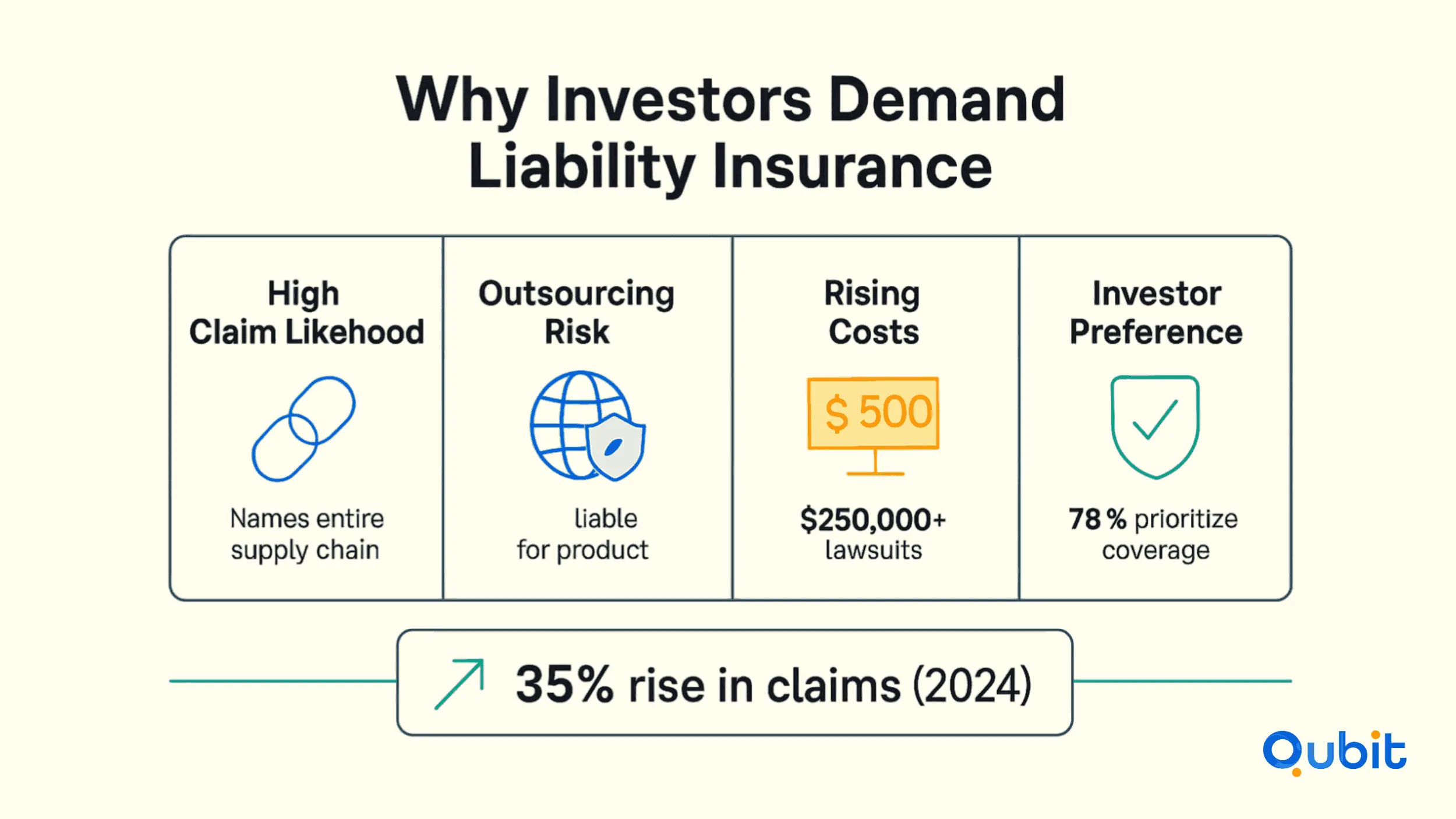Launching a new product feels like an exciting leap forward for any startup. It’s proof that your big idea is becoming real. But beneath this excitement lies a reality many founders overlook: the risk of product-related liabilities.
Investors put real money behind your vision. They want assurance that their investment is secure, even if things go sideways. Product liability insurance is one of the smartest ways to protect both your startup and your investor’s capital.
Your examination of product liability insurance expands as you consider insurance startup fundraising strategies, which shed light on the broader challenges faced by insurance start-ups in securing necessary capital.
This blog explores how product liability insurance not only shields businesses but also reassures investors, fostering confidence in product launches.
Let’s jump right in!
What exactly is product liability insurance?
Product liability insurance covers you if your product causes harm, injury, or damage. Think of it as your company’s shield against unexpected legal battles related to product defects or malfunction.
Say your AI-driven insurance platform wrongly rejects claims due to algorithm errors. Users could sue for financial damages. With the right coverage, your insurer steps in, covering your legal defense and any settlements.
In short, product liability insurance prevents one bad lawsuit from bankrupting your startup.
Why Product Liability Insurance Matters for Insurtech Startups
Insurtech companies operate in sensitive territory. Your products deal directly with people's finances, personal information, or health, high-stakes areas that naturally attract legal scrutiny.

In 2024 alone, claims related to AI bias or inaccurate automated risk assessments rose by over 35%. A single lawsuit related to faulty underwriting can cost over $250,000.
Investors know these risks, and they’re increasingly selective. A recent VC survey revealed 78% of investors prioritize startups that actively manage their product risks.
How Much Liability Coverage is Enough?
Picking the right coverage level can feel like guesswork. Too little coverage leaves you vulnerable. Too much drains resources better spent on growth.
Start by assessing your product’s real-world risks. For example:
- Could your AI underwriting mistakenly reject critical medical claims?
- What if your customer data handling causes privacy breaches?
- Are there regulatory compliance issues specific to your product?
Most early-stage insurtech startups start with $1M–$2M per claim and $2M–$5M total coverage per year. Adjust this upward as your business grows and risks increase.
Smart Ways to Afford Liability Insurance Early On
Insurance premiums can feel heavy for bootstrapped founders. But affordability comes down to choosing coverage wisely.
Here are practical tips:
- Start modular: Choose coverage directly aligned with your product’s core risks. Skip unnecessary add-ons early on.
- Scale progressively: Negotiate with insurers for a lower premium initially, with incremental increases as your product grows.
- Compare wisely: Work with specialized brokers familiar with insurtech. They find coverage tailored exactly to startups like yours.
Why Investors Insist on Liability Coverage
Investors consistently require startups, especially those manufacturing, distributing, or selling physical products, to secure product liability insurance as a condition of funding. Their insistence is rooted in both the frequency and severity of product-related claims, the broad legal exposure faced by all parties in the supply chain, and the potentially devastating financial consequences of even a single lawsuit.
Key Reasons Investors Demand Product Liability Coverage:
- High Likelihood of Claims:
In product liability cases, legal practice is to name every entity in the “chain of distribution”—from manufacturer to retailer, as a defendant. This means that even if your startup outsources manufacturing or is just a distributor, you are still exposed to lawsuits. Legal defense alone can be costly, regardless of actual fault, and settlements or judgments can be financially crippling for a young company. - Outsourcing Doesn’t Eliminate Risk:
Investors know that outsourcing manufacturing, especially to foreign suppliers, does not shield a startup from liability. If your name is on the product, you are often considered the “de facto” manufacturer in legal proceedings. This makes robust product liability coverage essential, regardless of your role in the supply chain. - Severity and Frequency of Claims:
Product liability settlements and judgments can be substantial, often far exceeding the direct costs of injury or property damage. Plaintiffs’ attorneys typically pursue not just actual damages but also lost wages, pain and suffering, and other indirect costs—multiplying potential payouts. The upward trend in settlement sizes over recent years increases the risk for investors, who want assurance that a single claim won’t wipe out their investment. - Financial Protection and Business Continuity:
Product liability insurance protects against the legal, settlement, recall, and compensation costs associated with product defects or failures. Without this coverage, a startup may be forced to deplete its resources, halt operations, or even declare bankruptcy in the face of a major claim. Investors require this protection to ensure the company can survive and continue growing after an incident. - Reputation Management:
Product issues can quickly erode customer trust and damage a startup’s reputation. Product liability policies often include support for public relations and crisis management, helping startups respond transparently and preserve stakeholder confidence—another key concern for investors. - Professionalism and Risk Management:
Requiring product liability insurance signals to investors that founders understand their risk environment and are committed to responsible business practices. This not only protects the company but also enhances its credibility in the eyes of future partners, customers, and acquirers
In particular, many investors insist on complementary coverage like Directors & Officers (D&O) insurance. D&O insurance protects founders and executives personally, not just the company.
Advantages of Product Liability Insurance: Mitigating Risks and Bolstering Reputation
Protecting your business from unforeseen challenges is essential, especially when it comes to product-related risks. Product liability insurance offers a robust safety net, shielding companies from financial losses and reputational damage caused by lawsuits or claims.
Financial Security Against Lawsuits
Legal disputes can drain resources and destabilize operations. Product liability insurance ensures that businesses are equipped to handle costly lawsuits, covering settlement expenses and legal fees. This financial protection stabilizes cash flow, allowing companies to focus on growth rather than unexpected liabilities.
Enhancing Brand Reputation
A company’s reputation is one of its most valuable assets. Comprehensive product liability coverage demonstrates a commitment to consumer safety and regulatory compliance. By proactively addressing risks, businesses can foster trust among customers and stakeholders, strengthening their market position.
Long-Term Cost Efficiency
Investing in product liability insurance is a strategic move that saves money in the long run. The proactive mitigation of risks reduces the likelihood of expensive legal battles, ensuring sustainable operations and preserving resources for innovation and expansion.
Real-World Scenarios: Learning From Others’ Mistakes
Here are two scenarios demonstrating why coverage matters:
Scenario 1: AI Underwriting Gone Wrong
A promising insurtech firm launched an AI-based underwriting product. A flaw caused hundreds of unjust claim denials, triggering a class-action lawsuit. Without liability coverage, legal costs nearly wiped out investor funds.
Scenario 2: Data Breach Crisis
An early-stage insurtech mishandled sensitive customer health data. A regulatory fine and multiple lawsuits hit simultaneously. Fortunately, their product liability insurance managed costs, saving both investor capital and their market reputation.
These real-world cases illustrate why insurtech investors now actively request proof of insurance coverage.
Conclusion
Early-stage insurtech founders juggle countless priorities. Liability insurance might not feel exciting compared to product development or fundraising pitches. Yet, smart insurance coverage directly supports your growth.
Your goal isn't just survival, it's thriving sustainably. By covering your startup against costly risks early, you create a secure foundation for investors, customers, and your team.
At Qubit Capital, we understand the importance of connecting businesses with the right resources. If you're seeking expert guidance to identify and approach the right investors, our Investor Discovery and Mapping service is here to help. Let us assist you in building meaningful connections that drive your business forward.
Key Takeaways:
- Product liability insurance shields startups and investor capital from costly legal claims.
- Insurtech startups face heightened risks due to sensitive data handling and algorithm-driven operations.
- Investors strongly prefer startups proactively managing risks through robust liability insurance.
- Coverage limits should realistically match your product's actual risk profile and potential liabilities.
- Complementary insurance like Directors & Officers (D&O) and Key-Person insurance reassures investors.
- Standalone, modular liability policies can offer targeted and cost-effective coverage options for early-stage startups.
Frequently asked Questions
Why do insurtech startups specifically need product liability insurance?
Insurtech startups handle sensitive customer data and use complex algorithms. Errors or breaches in these areas easily lead to costly lawsuits.


 Back
Back



